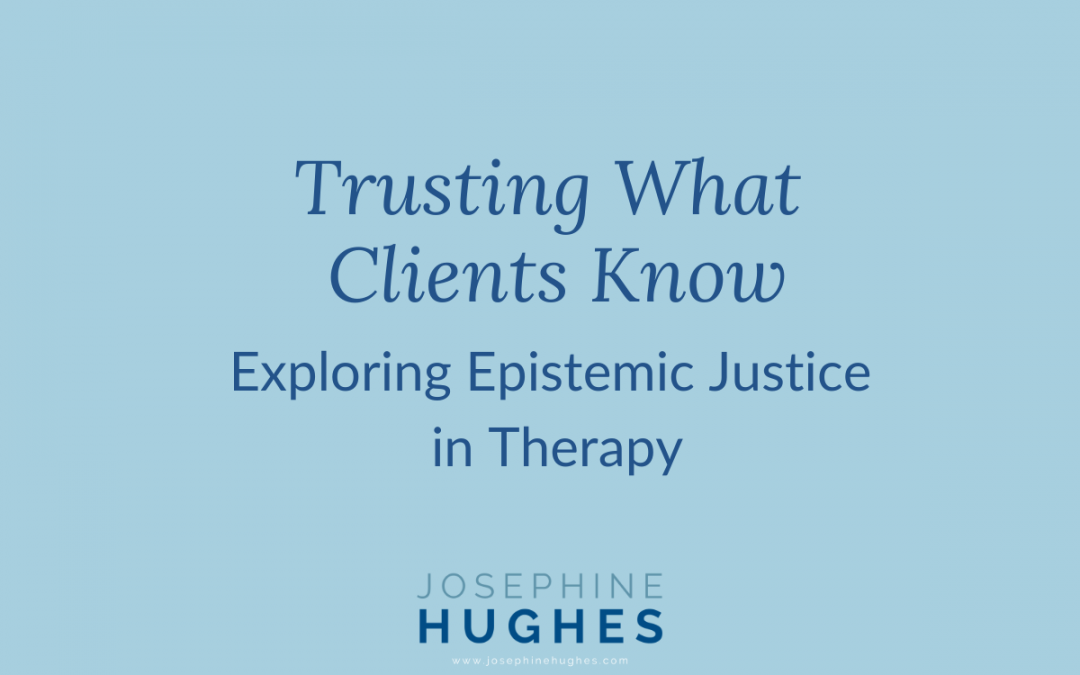We often talk about listening as one of the most important skills in therapy. But what if listening isn’t enough?
In this week’s Good Enough Counsellors podcast, I talk to therapist, trainer and writer Nicola Blunden about something that many therapists have never heard of – but which might be shaping our sessions in ways we don’t realise: epistemic injustice.
You can listen to the full episode here:
If you would like to subscribe to the podcast, click here.
This blog post shares a few of the themes we explored, but I really encourage you to listen to the conversation in full – especially if you’ve ever wondered how to make therapy safer, fairer, and more respectful for clients who’ve had their voices dismissed.
What Is Epistemic Injustice – and Why Does It Matter in Therapy?
Epistemic injustice is a term from philosophy that refers to situations where someone’s knowledge or lived experience is unfairly disbelieved, dismissed, or devalued. In therapy, this might happen when we:
- subtly doubt a client’s version of events
- lean too heavily on our own frameworks or theories
- fail to take into account the impact of race, class, gender, disability, or neurodivergence on how someone is heard or believed
As Nicola points out, many therapists are unaware of the epistemic injustices they might be enacting — not out of malice, but because traditional training hasn’t always invited us to look at power in this way.
Power, Voice and the Risk of Getting It Wrong
We also talk in the episode about the fear therapists often carry – the fear of saying the wrong thing, or of causing harm despite our best intentions.
For many of us, this fear can lead to staying quiet, avoiding certain topics, or unconsciously retreating into defensiveness. Nicola explains how this dynamic can get in the way of doing the reflective work that leads to better therapy.
She also offers gentle encouragement: that we can begin to move past fear by being open to feedback, questioning our assumptions, and recognising the ways in which we do (and don’t) hold power in the room.
Working With Clients Who Experience Multiple Parts
One part of the conversation I found particularly moving was Nicola’s reflections on working with people who experience themselves as having multiple parts – sometimes linked with diagnoses like Dissociative Identity Disorder (DID).
Rather than pathologising these experiences, Nicola invites us to approach them with respect and openness – to believe clients when they tell us what’s true for them, and to allow space for multiple ways of knowing and being.
This isn’t always easy. It asks us to set aside our desire to understand everything through a single lens. But it’s part of the deeper invitation of epistemic justice: to share the space, and trust that clients are the experts on their own lives.
Why This Matters for Marginalised Clients
If you work with marginalised clients such as people of colour and those who are neurodivergent, disabled or LGBTQIA+, this conversation is especially relevant. Nicola shares how easy it is for therapists – especially those in positions of social privilege – to unconsciously dismiss or reshape a client’s experience to fit what feels more familiar or acceptable.
This doesn’t mean we’re bad therapists. But it does mean we have to be honest with ourselves about the impact of who we are, and what we’ve been taught, on how we show up in the room.
A Call to Reflect, Not Retreat
One of the things I most appreciated in this episode was Nicola’s tone. There’s no shaming here. No checklist of things to get right. Instead, there’s an invitation to stay curious, listen more deeply, and make space for what clients already know.
Whether you’re just beginning to explore these ideas or they’re already part of your thinking, I think you’ll find something valuable in what Nicola shares.
Listen to the full episode here: Trusting What Clients Know with Nicola Blunden – Good Enough Counsellors Podcast
Looking for Support as You Grow Your Practice?
If this conversation has got you thinking about how you show up in your work – or what holds you back – you might find what you’re looking for inside Therapy Growth Group.
It’s a supportive space to build your confidence, develop your marketing, and grow a private practice that feels aligned with your values. Find out more here: Therapy Growth Group

